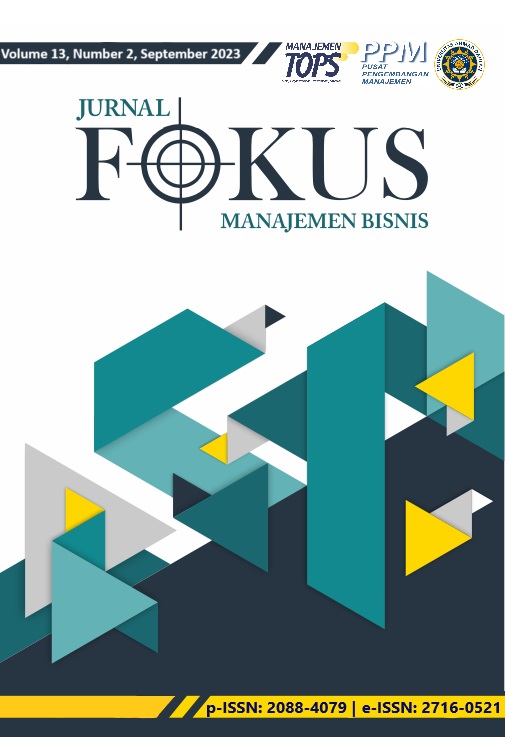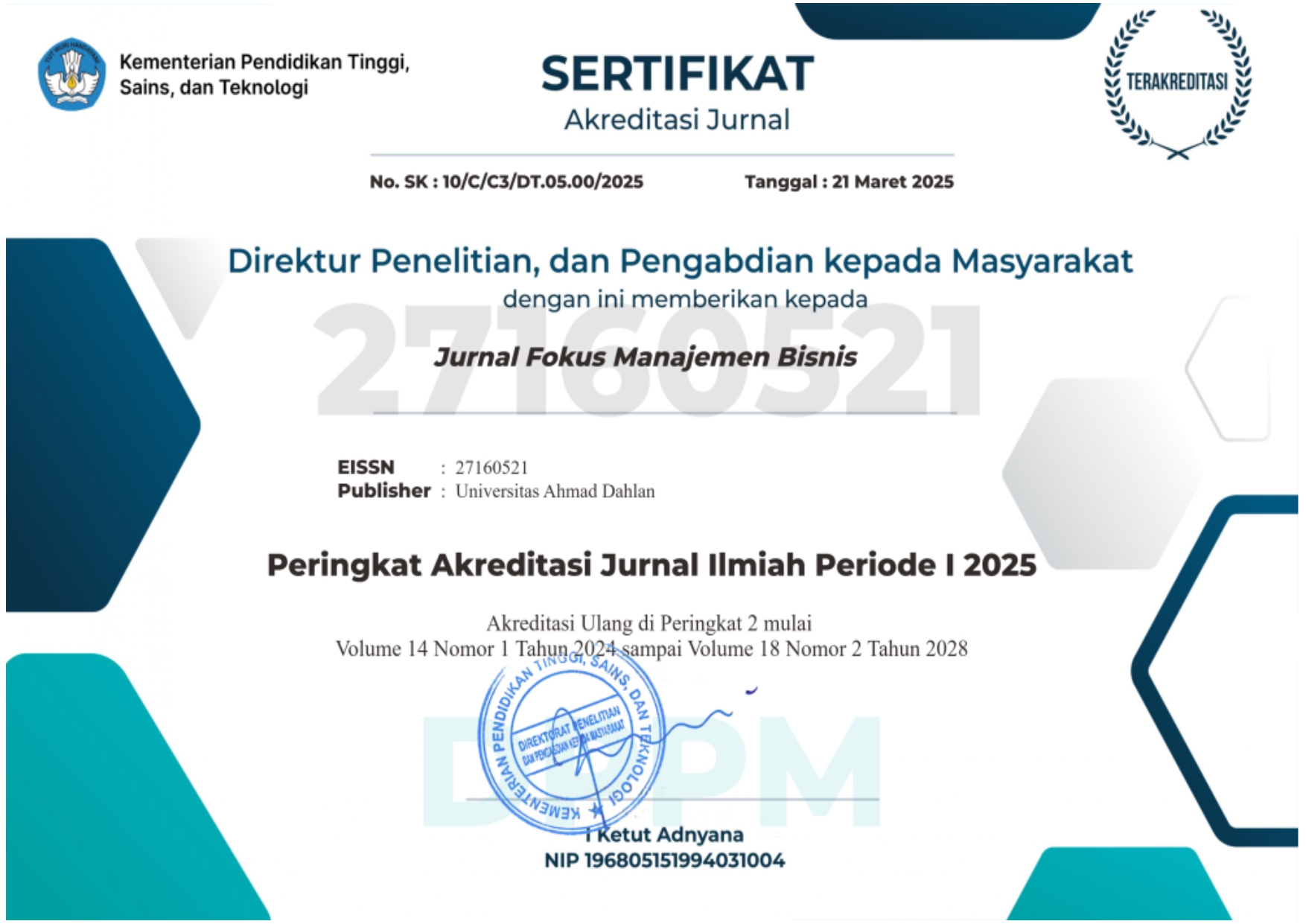The effect of financial technology, online shopping, and self-control on consumptive behavior
DOI:
https://doi.org/10.12928/fokus.v13i2.9081Abstract
Technological advancements have now been felt in business, particularly in financial services companies. The financial services industry innovates in financial services, namely building financial technology. This study aims to determine the influence of financial technology, online shopping, and self-control on the consumptive behavior of Generation Z in Yogyakarta. The sample in this study was 520 respondents taken by sampling technique using non-probability sampling with purposive sampling method. The data obtained is then processed using the Smart PLS statistical tool. The results showed that online shopping had a negative influence on consumptive behavior, while financial technology and self-control showed a positive impact on consumptive behavior.
References
Al-Jauziyah, I. Q. (2013). Madarijus Salikin: Penjabaran Kongkrit "Iyyaka Na’budu Wa Iyyaka Nasta’in". Pustaka Al-Kautsar.
Averill, J. R. (1973). Personal Control over Aversive Stimuli and its Relationship to Stress. Psychological Bulletin, 80(4). https://doi.org/10.1037/h0034845
Belk, R. W. (1985). Materialism: Trait Aspects of Living in the Material World. Journal of Consumer Research, 12(3). https://doi.org/10.1086/208515
Chita, R. C. M., David, L., & Pali, C. (2015). Hubungan antara Self-Control dengan Perilaku Konsumtif Online Shopping Produk Fashion pada Mahasiswa Fakultas Kedokteran Universitas Sam Ratulangi Angkatan 2011. Jurnal E-Biomedik, 3(1). https://doi.org/10.35790/ebm.3.1.2015.7124
Dewi, N., Rusdarti, & Sunarto, S. (2017). Pengaruh Lingkungan Keluarga, Teman Sebaya, Pengendalian Diri dan Literasi Keuangan terhadap Perilaku Konsumtif Mahasiswa. Journal of Economic Education, 6(1).
Dikria, O., & Mintarti, S. U. (2017). Pengaruh Literasi Keuangan dan Pengendalian Diri terhadap Perilaku Konsumtif Mahasiswa Jurusan Ekonomi Pembangunan Fakultas Ekonomi Universitas Negeri Malang Angkatan 2013. Pendidikan Ekonomi, 09(2).
Duckworth, A. L., Gendler, T. S., & Gross, J. J. (2016). Situational Strategies for Self-Control. Perspectives on Psychological Science, 11(1). https://doi.org/10.1177/1745691615623247
Farida, M. N., & Subroto, W. T. (2019). Effect of Mobile Banking and Online Shopping on Consumer Behavior. International Journal of Educational Research Review, 4(2). https://doi.org/10.24331/ijere.517977
Fromm, E. (2017). The Sane Society. The Sane Society. https://doi.org/10.4324/9780203820179
Ghozali, I. (2017). Structural Equation Modeling: Metode Alternatif dengan Partial Least Square (PLS). Badan Penerbit Universitas Diponegoro.
Gomber, P., Kauffman, R. J., Parker, C., & Weber, B. W. (2018). On the Fintech Revolution: Interpreting the Forces of Innovation, Disruption, and Transformation in Financial Services. Journal of Management Information Systems, 35(1). https://doi.org/10.1080/07421222.2018.1440766
Gunawan, A. (2023). Financial Literacy and Use of Financial Technology Payment for Consumptive Behavior. International Journal of Business Economics (IJBE), 4(2), 91–100. https://doi.org/10.30596/ijbe.v4i2.14233
Hair, J. F., Howard, M. C., & Nitzl, C. (2020). Assessing Measurement Model Quality in PLS-SEM using Confirmatory Composite Analysis. Journal of Business Research, 109. https://doi.org/10.1016/j.jbusres.2019.11.069
Handayani, R., & Nilasari, I. (2021). Effect of Online Shopping on Consumtive Behavior in Pandemic Time Covid-19. Turkish Journal Of Computer and Mathematics Education, 12(8).
Harahap, D. A., & Amanah, D. (2018). Online Purchasing Decisions of College Students in Indonesia. International Journal of Latest Engineering Research and Applications, 3(10).
Hayati, A., Yusuf, A. M., & Asnah, M. B. (2020). Contribution of Self Control and Peer Conformity to Consumptive Behavior. International Journal of Applied Counseling and Social Sciences, 1(2). https://doi.org/10.24036/005344ijaccs
Herkulana, H., Mashudi, M., & Ray, M. K. J. (2022). Pengaruh Penggunaan Fintech Mobile Payment Danaplikasi Belanja Online terhadap Perilaku Konsumtif Mahasiswa Pendidikan Ekonomi FKIP Untan. Jurnal Pendidikan Dan Pembelajaran Khatulistiwa, 11(9).
Kalolo, J. F. (2019). Digital Revolution and its Impact on Education Systems in Developing Countries. Education and Information Technologies, 24(1). https://doi.org/10.1007/s10639-018-9778-3
Kim, Y., Choi, J., Park, Y. J., & Yeon, J. (2016). The Adoption of Mobile Payment Services for Fintech. International Journal of Applied Engineering Research, 11(2).
Kusumadewi, S., Hardjajani, T., & Priyatama, A. N. (2012). The Correlation between The Social Support of Peer Group and Self-control Towards The Obedience of The Rule in The Teenage Girls of The Assalam Modern Islamic Boarding School Sukoharjo. Jurnal Ilmiah Psikologi, 1(2), 1–10.
Lina, L., & Rosyid, H. F. (1997). Perilaku Konsumtif Berdasarkan Locus of Control pada Remaja Putri. Psikologika: Jurnal Pemikiran Dan Penelitian Psikologi, 2(4). https://doi.org/10.20885/psikologika.vol2.iss4.art1
Monsuwé, T. P. Y., Benedict, G. C. D., & Ko, D. R. (2004). What Drives Consumers to Shop Online? A Literature Review. International Journal of Service Industry Management, 15(1). https://doi.org/10.1108/09564230410523358
Mujiyana, M., & Elissa, I. (2013). Analisis Faktor-Faktor Yang Mempengaruhi Keputusan Pembelian Via Internet pada Toko Online. Jurnal Teknik Industri, 8(3). https://doi.org/10.12777/jati.8.3.143-152
Ng, A. W., & Kwok, B. K. B. (2017). Emergence of Fintech and Cybersecurity in A Global Financial Centre: Strategic Approach by A Regulator. Journal of Financial Regulation and Compliance, 25(4). https://doi.org/10.1108/JFRC-01-2017-0013
Nižetić, S., Šolić, P., López-de-Ipiña González-de-Artaza, D., & Patrono, L. (2020). Internet of Things (IoT): Opportunities, Issues and Challenges towards A Smart and Sustainable Future. Journal of Cleaner Production, 274. https://doi.org/10.1016/j.jclepro.2020.122877
Putri, L. P., & Christiana, I. (2021). Peran Financial Technology dalam Membantu UMKM Di Tengah Pandemi Covid-19. Ekonomikawan: Jurnal Ilmu Ekonomi Dan Studi Pembangunan.
Rachmawati, R., & Maulani, G. A. F. (2020). Influence of Marketplace Usage of Uniga Student Shopping Consumptive Behaviour. Management and Entrepreneurship Research Review, 1(2).
Roberts, J. A., & Jones, E. (2001). Money Attitudes, Credit Card Use, and Compulsive Buying among American College Students. Journal of Consumer Affairs, 35(2). https://doi.org/10.1111/j.1745-6606.2001.tb00111.x
Sari, M., Adilla Bahri Lubis, N., & Jufrizen, J. (2021). The Effect of Financial Literature and Self Control on Consumption Behavior (Study on Students of The Faculty of Economics and Business Universitas Muhammadiyah Sumatera Utara). International Journal of Economic, Business, Accounting, Agriculture Management and Sharia Administration, 1(2). https://doi.org/10.54443/ijebas.v1i2.40
Septiansari, D., & Handayani, T. (2021). Pengaruh Belanja Online terhadap Perilaku Konsumtif pada Mahasiswa di Masa Pandemi Covid-19. Jurnal Ekonomi Teknologi Manajemen, 5(1).
Siqueira, J. R., Peña, N. G., ter Horst, E., & Molina, G. (2019). Spreading the Word: How Customer Experience in a Traditional Retail Setting Influences Consumer Traditional and Electronic Word-of-mouth Intention. Electronic Commerce Research and Applications, 37. https://doi.org/10.1016/j.elerap.2019.100870
Sumartono, S. (2002). Terungkap dalam Iklan: Meneropong Imbas Pesan Iklan Televisi. CV Alfabeta.
Tripambudi, B., & Indrawati, E. S. (2020). Hubungan antara Kontrol Diri dengan Perilaku Konsumtif Pembelian Gadget pada Mahasiswa Teknik Industri Universitas Diponegoro. Jurnal Empati, 7(2). https://doi.org/10.14710/empati.2018.21683
Vinson, D. E., Scott, J. E., & Lamont, L. M. (1977). The Role of Personal Values in Marketing and Consumer Behavior. Journal of Marketing, 41(2). https://doi.org/10.1177/002224297704100215
Wang, Y., Zhou, J., Gu, X., Zeng, X., & Wu, M. (2023). The Effect of Self-Compassion on Impulse Buying: A Randomized Controlled Trial of an Online Self-Help Intervention. Mindfulness, 14(6). https://doi.org/10.1007/s12671-023-02139-y
Downloads
Published
How to Cite
Issue
Section
License
Copyright (c) 2023 Tina Sulistiyani, Ariharaan Muthusamy, Ahmad Rizal Solihudin

This work is licensed under a Creative Commons Attribution-ShareAlike 4.0 International License.
Authors who publish with this journal agree to the following terms:Â
- Authors retain copyright and grant the journal right of first publication with the work simultaneously licensed under a Creative Commons Attribution License that allows others to share the work with an acknowledgment of the work's authorship and initial publication in this journal.
- Authors are able to enter into separate, additional contractual arrangements for the non-exclusive distribution of the journal's published version of the work (e.g., post it to an institutional repository or publish it in a book), with an acknowledgment of its initial publication in this journal.
- Authors are permitted and encouraged to post their work online (e.g., in institutional repositories or on their website) prior to and during the submission process, as it can lead to productive exchanges, as well as earlier and greater citation of published work (See The Effect of Open Access).







